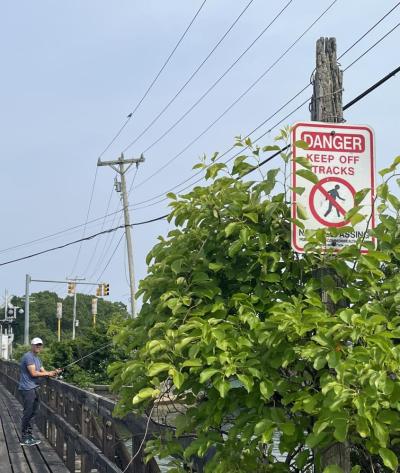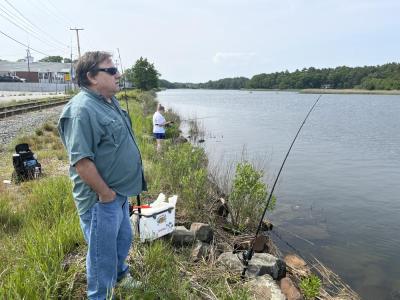After fatal accident, fishers still lured to train tracks
Some of those fishing in the Wareham River along the Merchants Way train tracks on Sunday, June 11 were using rods. Others were using nets. All of them, however, had the same question: How could Christopher Cater not have heard the oncoming train?
Cater, 56, of Dorchester, was struck and killed by a train while fishing on the Narrows railroad bridge on Thursday, June 8. According to the Plymouth County District Attorney’s Office, the train sounded its horns multiple times as it approached Cater, but he did not move out of the way.
“I know when the train’s coming,” said Wareham resident Bill Brown, who has been fishing along Merchants Way for 50 years. “I always fish in the corner where the guy was hit. I don’t worry about it hitting me... I just keep my eye open, in case I have to jump out of the way.”
The Wareham River is separated from Merchants Way by train tracks. The land the train tracks are on is owned by MassDOT. The tracks themselves are operated and maintained by the Massachusetts Coastal Railroad, and there are No Trespassing signs posted along Merchants Way.
“There are constantly calls being made to the Wareham Police Department regarding trespassers on the railroad,” said Massachusetts Coastal Railroad President and CEO Christopher Podgurski. “It’s a dangerous location.”
However, countless fishers, kayakers and other hobbyists disregard the signs, even after Cater’s death.
“The very next day, our operations called the police department again for other trespassers on the bridge fishing,” Podgurski said.
“If they’re crossing the track, they’re in violation,” said Garry Buckminster, director of the Wareham Department of Natural Resources.
Brown said that people come from New Bedford, Fall River and Worcester to fish on Merchants Way.
“I have no idea why,” he said. “You know how many fishing places there are [over] there? Crazy.”
Buckminster said that the Wareham River contains striped bass, bluefish and scup. Early in the season, it is also a pass for migrating herring, pursued by their predators. The deep water that flows under the Narrows railroad bridge is ideal for fishing.
“The signs are posted that you can’t be on that area,” Buckminster said, “and unfortunately [Cater] didn’t adhere to what was posted.”
The train was going at its top speed of 25 miles per hour when it hit Cater, Podgurski said. He added that the Cape Flyer, which goes up to 50 miles per hour, “has had numerous close calls” with fishers.
In the past, Wareham Police and Massachusetts Environmental Police officers have cited many people for catching blue crabs in the river.
“You see 50, 60 people out there fishing for crabs,” Buckminster said. “They’re clearly not following the signs.”
Since MassDOT has the right of way, that is the most the town can do to enforce the rules against trespassing.
On Sunday afternoon, Ed Ramirez, of Boston, cast his line from the railroad bridge where Cater was hit.
“I like that it’s a quiet place,” he said. “A couple times, I get really good fish.”
He was confused as to how Cater could not have seen, heard or felt the vibrations of the oncoming train.
“When I see the train, I move out of the way,” he said. “Every time. You can hear it from a mile away.”
Buckminster said that there is no solution to the trespassing problem other than “people paying attention.”
Podgurski said that the railroad calls the police whenever it sees trespassers, and that he has “no idea” why Cater wasn’t stopped. He said that increased awareness of the rules against trespassing could prevent such tragedies.
“I feel sad for [Cater],” Brown said, “I feel sad for the train [conductor]. I just hope they don’t go out of control and shut the whole place down from fishing. That wouldn’t be right.”















